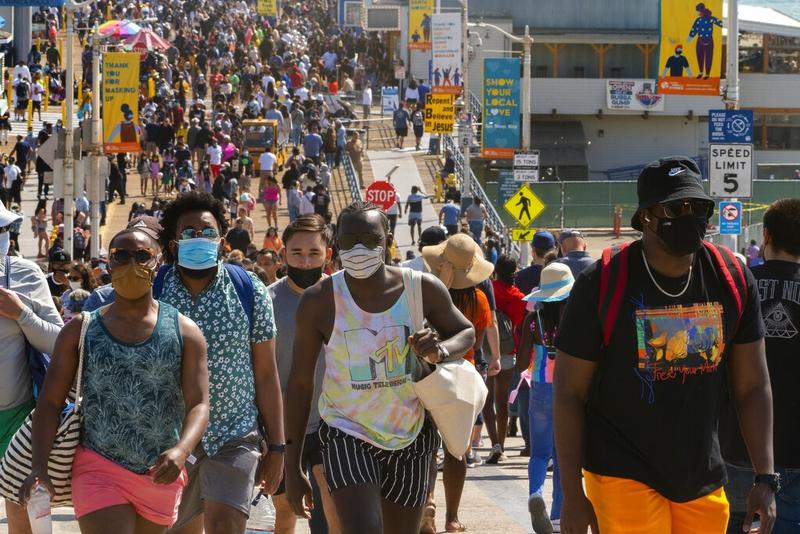Country with most deaths reckoned to be No 1 on resilience in pandemic fight
 FILE - In this May 29, 2021, file photo, people crowd the Santa Monica Pier in Santa Monica, California. (DAMIAN DOVARGANES, FILE / AP)
FILE - In this May 29, 2021, file photo, people crowd the Santa Monica Pier in Santa Monica, California. (DAMIAN DOVARGANES, FILE / AP)
A rating by the news outlet Bloomberg ranking countries based on how quickly they have returned to normal life following the pandemic has found itself mired in controversy.
Bloomberg scores the largest 53 economies globally and reckons that the United States, which has recorded the most COVID-19 deaths of any country, is No 1.
Bloomberg started the COVID Resilience Ranking in November and has updated it monthly, but in June it changed its metric to "accommodate the shift in COVID-19 management".
Under the new metric, the US topped the list, after having ranked 13th in the May report. Some have suggested the changing metric is mostly concerned about ensuring the US is ranked No 1.
"They are playing with numbers to try to tell stories that they want to tell," said Aaron Mitchell, who lives in New York.
Last month, the US continued to lead the world in COVID-19 cases and deaths. Last month on average 300 people in the country died each day as a result of the virus, according to the US Centers for Disease Control and Prevention.
According to Bloomberg, a big drag on China, which is ranked eighth, is "lockdown severity". The publication interprets "lockdown severity", a sign that a government is acting aggressively to control the virus, as a negative indicator in the ranking because "social and economic activity are tightly restricted by government policy", resulting in "greater disruption to lives".
"It's not an easy question to answer if you're saying we are going forward, how do we reopen the economy, how do we allow freedom of motion, businesses, restaurants?" said Alexej Jerschow, a professor of chemistry at New York University who has created an online tool comparing COVID-19 data from the US and other countries. "I don't think there's a simple answer to just talk about lockdown severity," Jerschow said.
A closer look at the interpretation of "lockdown severity" reveals that Bloomberg agrees that a "lockdown in one city or area will be the basis" for an entire country's performance.
This means that as the publication lists China as one of the countries with the worst "lockdown severity" performance, most of China's 1.4 billion people face barely any limits on their movement.
Mitchell said: "Pretend that New York City, which has a great number of COVID-19 numbers right now, figured out that Staten Island was about to have big outbreaks, they shut down Staten Island for two weeks and the entire city's COVID-19 numbers all go to the ground, because they contained it. And they opened up Staten Island after that, everyone's better. But this score means that they get penalized for that.
"That's a contradiction of the definition of their metric."
Negative view
According to a Twitter analysis, there are three times as many people who have expressed a negative view of Bloomberg's report than those who have expressed agreement with it.
"More than 0.6 million deaths, and the US is now the best place to be during the pandemic, congratulations," one Twitter user wrote.
"What lockdowns are there even in China? The whole country has been fully reopened for like a year," another said.
A recent Bloomberg article reported research showing that "despite calls for solidarity, many countries have undermined the global fight against COVID-19 by acting in their own self-interest and failing to look after their most vulnerable citizens".
The World Health Organization has said the US and other wealthy countries have secured almost 90 percent of the available coronavirus vaccine supply, leaving poor countries struggling to have their citizens vaccinated.
Inequitable access to vaccines is the most evident example of disunity, according to the study led by Chatham House, a think tank in London. Rich countries have cornered the vaccine market, hampering global partnerships such as the COVAX distribution program, the authors wrote.


